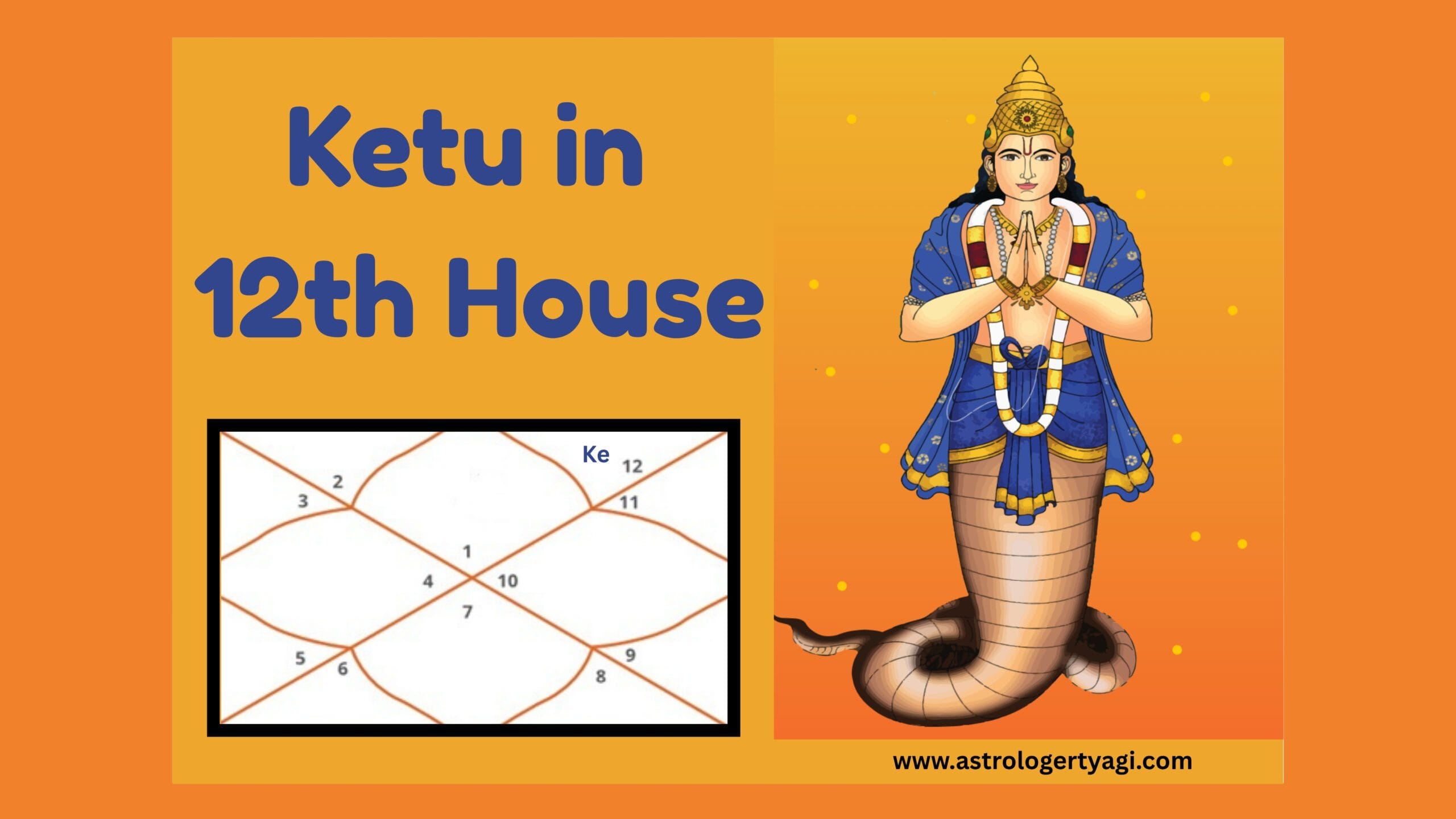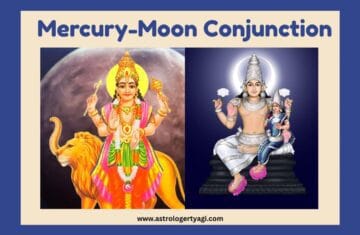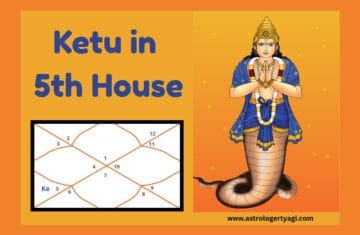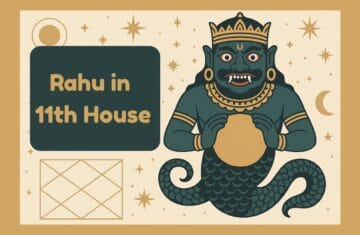1. Introduction
In Vedic Astrology, the placement of Ketu in 12th House holds profound significance, impacting an individual’s relationship with spirituality, foreign lands, isolation, expenditures, hidden enemies, and ultimately, liberation (moksha). When Ketu resides in the 12th House of the Kundli, it creates a unique and often transformative position, indicating strong karmic lessons related to detachment from worldly desires and a deep inclination towards the transcendental.
The 12th house is known as the Vyaya Bhava (the house of expenditure and losses) and also represents foreign settlement, confinement (hospitals, prisons), isolation, intuition, the subconscious mind, dreams, hidden enemies, spiritual retreat, and the ultimate liberation from the cycle of birth and death (moksha). When Ketu, a shadow planet known for detachment, past life expertise, spiritual insight, and liberation, sits here, it tends to make the native less concerned with worldly losses or material gains and may bring unusual dynamics with foreign experiences and spiritual awakening.
This placement is considered a pivotal position for Ketu, fueling an innate drive towards seeking deeper meaning beyond superficial existence, often leading to profound spiritual experiences, charitable endeavors, and a path towards ultimate freedom. This energy can act as a double-edged sword, representing both powerful opportunities for spiritual advancement and challenges related to financial losses, self-undoing, and isolation.

2. What is Ketu in Vedic Astrology?
Ketu, which is represented as the South Node of the Moon, is a shadow planet in Vedic astrology, without having a physical body. In mythology, this represents the cut-off tail of a heavenly snake. It’s a symbol of past life karma, detachment, liberation, and spiritual enlightenment.
Ketu represents detachment, spirituality, intuition, and an interest in the esoteric and mystical. It signifies our past life expertise and accumulated wisdom, which leads us towards experiences that can both fulfill and connect us in this life, often by detaching us from what we once craved. As compared to Rahu, which is represented as the North Node of obsession and material desires, Ketu guides us toward the inner world and liberation from worldly attachments. Understanding Ketu’s energy is critical to determining its impact on any house.
3. What Does the 12th House Represent?
The 12th house, known as the Vyaya Bhava (the house of losses, expenditure, or dissolution) or Moksha Sthana (the house of liberation), governs various fundamental aspects of our lives related to endings, subconscious realms, and the beyond, such as:
- Expenditures & Losses: Financial outflows, wasteful spending, and material losses.
- Foreign Travel & Settlement: Long-distance journeys, living in foreign lands, and expatriate experiences.
- Isolation & Confinement: Hospitals, prisons, ashrams, meditation retreats, and self-imposed solitude.
- Intuition & Subconscious Mind: Dreams, hidden abilities, psychic perceptions, and the deepest layers of the psyche.
- Moksha & Liberation: Spiritual enlightenment, freedom from the cycle of rebirth, and connection to the divine.
- Hidden Enemies: Adversaries who operate secretly, conspiracies, and unforeseen challenges.
- Charity & Altruism: Selfless giving, philanthropic activities, and service to humanity.
- Sleep & Dream World: Quality of sleep and experiences in dreams.
It is the house that represents our capacity for letting go, our connection to the unseen realms, and our journey towards ultimate spiritual freedom.
4. Effects of Ketu in 12th House
When Ketu occupies the 12th house, its inherent qualities blend with the significations of this house, leading to unique personality traits and behavioral patterns. Ketu’s influence here often points to a past life where the native was deeply involved in spiritual practices, foreign affairs, or experienced significant losses, leading to a sense of completion or detachment in the current life.
Personality Traits:
- Deeply Spiritual: Individuals possess a natural and profound spiritual inclination, often seeking solitude for meditation or introspection. They have an inherent detachment from worldly glamour.
- Intuitive & Psychic: Highly sensitive to unseen energies, with strong intuitive or even psychic abilities, often experiencing vivid dreams or premonitions.
- Detached from Material World: A natural disinterest in excessive material accumulation, often finding contentment in simplicity or spiritual pursuits, leading to a philosophical acceptance of losses.
- Reclusive Tendencies: May have a preference for solitude, quiet environments, or working behind the scenes, finding solace away from the hustle and bustle of public life.
- Philosophical & Reflective: Prone to deep contemplation on the nature of existence, spirituality, and the ultimate purpose of life.
Behavioral Patterns:
- Unconventional Foreign Experiences: They may have unusual or unexpected experiences in foreign lands, or a strong pull towards settling abroad, often for spiritual reasons or due to a feeling of not belonging in their native land.
- Generous & Charitable: A strong inclination towards selfless giving, charity, and working for humanitarian causes, often without seeking recognition.
- Subtle Self-Undoing: Sometimes, their detached nature can lead to unconscious self-sabotage, or an inability to assert themselves in practical matters, leading to unseen losses.
- Seeking Spiritual Retreats: May frequently seek out ashrams, meditation centers, or secluded places for spiritual practice and inner rejuvenation.
- Dealing with Hidden Enemies: While Ketu offers protection, they may still encounter hidden adversaries, but often manage them through their detached nature or spiritual strength, as such enemies become powerless against their lack of attachment.
5. Positive Effects
When Ketu in the 12th house is well-placed (e.g., in a water sign, or receiving beneficial aspects from Jupiter), or when the native consciously works with its energy, it can manifest powerfully positive outcomes:
- Path to Moksha & Liberation: This is considered one of the best placements for spiritual liberation (moksha). It fosters a natural detachment from worldly illusions, leading to deep spiritual realization and ultimate freedom.
- Profound Intuition & Psychic Abilities: Grants highly developed intuition, strong dreams, clairvoyant abilities, and a deep connection to the subconscious and unseen realms.
- Successful Foreign Settlement: Can facilitate successful settlement in foreign lands, particularly for spiritual purposes, or for work that requires isolation or a unique perspective.
- Protection from Hidden Enemies: Ketu here tends to nullify the power of hidden enemies, making their efforts ineffective against the native’s detached and spiritual demeanor.
- Reduced Material Attachment: Freedom from the constant craving for material possessions, leading to inner peace and contentment, even amidst external losses or expenditures.
- Philanthropic & Altruistic Nature: A strong desire for selfless service, leading to significant contributions to charity, humanitarian causes, or spiritual missions without seeking personal gain.
- Mastery of Meditation & Yoga: Excellent for deep meditation, yoga, and other spiritual practices, leading to profound states of consciousness.
6. Negative Effects
Afflictions to Ketu (e.g., by malefic planets like Mars or Saturn, or being in a debilitated sign) or negative influences on the 12th house can lead to challenging manifestations:
- Excessive Expenditures & Losses: A tendency for financial losses, wasteful spending, or unexpected expenses that drain resources. Could lead to situations of debt or financial instability due to a lack of practical concern for money.
- Self-Undoing & Unconscious Sabotage: The detached nature can sometimes lead to unconscious self-sabotage, making it difficult to achieve worldly success or maintain practical stability.
- Mental Confusion & Hallucinations: If highly afflicted, it can lead to confusion, disorientation, difficulty discerning reality from illusion, or even psychological issues like paranoia or hallucinations.
- Loneliness & Isolation: While they seek solitude, an afflicted Ketu can lead to involuntary isolation, loneliness, or feelings of being misunderstood and disconnected from society.
- Undiagnosed Illnesses: Prone to chronic or strange illnesses that are difficult to diagnose or treat, often with psychosomatic origins.
- Sleep Disturbances: Can cause disturbed sleep patterns, vivid or disturbing dreams, or insomnia due to an overactive subconscious mind.
- Difficulties in Foreign Lands: Despite a pull towards foreign lands, experiences there might be challenging, involving difficulties in adjustment or unexpected losses.
7. Impact on Spirituality & Foreign Lands
Ketu in the 12th house gives a unique, often profound, impact on spirituality and experiences in foreign lands. It signifies a past life where the native likely achieved spiritual proficiency or spent significant time in isolated/foreign environments, leading to a current life detachment from conventional worldly pursuits in these areas.
- Deep Spiritual Inclination: A natural, inherent pull towards spirituality, meditation, yoga, and esoteric studies. The native feels a sense of completion with material pursuits and seeks higher truths.
- Unconventional Spiritual Path: Their spiritual journey may be unique, independent, and not conform to established religious doctrines. They may find their own path to liberation through personal experiences.
- Love for Solitude & Retreats: A strong desire for periods of solitude, spiritual retreats, or living in remote places conducive to introspection and inner peace.
- Karmic Connection to Foreign Lands: There’s a strong karmic connection to foreign lands. They may feel more at home abroad, or their destiny may lead them to settle far from their birthplace, often for spiritual or humanitarian reasons.
- Intuitive & Psychic Experiences: Heightened sensitivity to the unseen, leading to vivid dreams, premonitions, and a natural ability to connect with spiritual realms.
- Detachment from Material Gains Abroad: Even if successful abroad, there’s often a subtle detachment from the material wealth gained, focusing more on the experience or spiritual growth.
8. Impact on Losses & Liberation
The influence of Ketu in the 12th house significantly impacts material losses, expenditures, and the ultimate path to spiritual liberation (moksha), often bringing profound karmic lessons.
- Philosophical Acceptance of Losses: The native tends to view material losses or significant expenditures with a philosophical and detached attitude, understanding them as part of life’s transient nature or as karmic clearing.
- Path to Moksha: This is a prime placement for moksha. Ketu here indicates that the soul is nearing the end of its cycle of rebirth and is actively seeking liberation from worldly attachments. Life experiences, including losses, serve to deepen this detachment.
- Unconventional Spending Habits: May have peculiar or unconventional spending habits, sometimes leading to unexpected losses, or a lack of concern for budgeting and saving, as they prioritize non-material aspects of life.
- Self-Sacrifice & Altruism: There’s a strong inclination towards selfless giving, charity, and sacrificing personal comfort for the benefit of others, especially those in need or spiritual causes. This acts as a karmic cleansing.
- Hidden Enemies: While Ketu often protects, hidden enemies may still exist, but their efforts are usually thwarted by the native’s spiritual strength and detachment, as there is nothing material to cling to or manipulate.
- Releasing Illusions: The 12th house signifies illusions and the subconscious. Ketu here facilitates the shedding of illusions, bringing clarity about the true nature of reality and the transient nature of worldly existence.
9. Impact on Career & Public Life
Ketu in the 12th house can propel individuals towards unconventional careers, often involving spirituality, humanitarian work, research in isolated settings, or roles that require working behind the scenes.
- Ideal Professions: Spiritual teachers, monks, meditators, mystics, astrologers, psychic healers, researchers in secluded labs, charity workers, humanitarian aid workers, expatriate workers (especially in spiritual or care-giving fields), employees in hospitals or correctional facilities, or any profession that involves working in isolation, behind the scenes, or for a higher, selfless purpose.
- Success Through Detachment & Intuition: Their ability to delve deeply into the unseen, their strong intuition, and their willingness to work without ego can lead to profound success in specialized or overlooked fields, particularly those involving service or spiritual pursuits.
- Unconventional Public Recognition: Their fame or recognition might come from unexpected sources, for work that is not initially mainstream, or after a period of obscurity. They may not actively seek public validation, yet it finds them, often related to their spiritual or humanitarian contributions.
- Work in Isolated Environments: They may thrive in work environments that are secluded, require deep concentration, or involve serving those in confinement (e.g., prisoners, patients).
- Philanthropic or Spiritual Missions: May use their skills and resources for spiritual missions, humanitarian endeavors, or charitable organizations rather than purely commercial ventures, often leading to a sense of deep fulfillment.
10. Ketu in 12th House in Different Signs
The zodiac sign Ketu occupies in the 12th house further nuances its effects, coloring its detachment and spiritual inclination with the qualities of that sign.
- Fire Signs (Aries, Leo, Sagittarius): This placement brings a dynamic yet detached approach to spiritual pursuits and foreign lands. There’s a courageous drive for spiritual liberation, but perhaps impulsive or unconventional methods in their quest for moksha. Expenditures might be sudden but lead to spiritual lessons.
- Earth Signs (Taurus, Virgo, Capricorn): A practical yet detached approach to material losses and foreign settlement. Disciplined and methodical spiritual practices, often focused on grounding or serving others. Losses might be tied to practical matters but lead to a philosophical acceptance. Interest in spiritual or hidden aspects of wealth.
- Air Signs (Gemini, Libra, Aquarius): Intellectual and analytical approach to spirituality, often abstract or unconventional. There’s a detached curiosity in foreign cultures, seeking intellectual compatibility over emotional intensity. Expenditures may be on books, travel, or intellectual pursuits. Spiritual insights come through reason and detachment.
- Water Signs (Cancer, Scorpio, Pisces): Deeply emotional yet detached from emotional dramas related to isolation or hidden enemies. A profound spiritual quest for liberation, often intuitive or psychic, leading to deep meditative states. Losses are felt deeply but lead to profound emotional release. This placement is particularly strong for spiritual development and connection to the divine subconscious.
11. Ketu in 12th House in Navamsa (D9)
In Vedic Astrology, the Navamsa chart (D9) is a crucial divisional chart, often considered a blueprint for one’s destiny after marriage, deep spiritual path, and the true essence of planets. It’s like a deeper layer of your main birth chart (D1), showing the subtle influences that shape your relationships, inner self, and ultimate purpose.
Now, let’s talk about Ketu in the 12th house of your Navamsa (D9) chart. The 12th house generally relates to expenditures, losses, foreign settlement, isolation, and spiritual liberation. When Ketu, a shadow planet known for detachment, past life insight, and spiritual inclination, sits here in your D9, it can have some interesting effects on your married life and spiritual journey:
Key Influences of Ketu in D9’s 12th House:
- Spiritual Union & Intimacy: This placement can indicate a unique or detached approach to marital intimacy, often seeking a deeper, spiritual connection over purely physical aspects. The marital relationship might be a catalyst for spiritual growth and liberation.
- Foreign Settlement & Spiritual Pursuit in Marriage: There’s often a strong pull towards foreign lands after marriage, or the couple might find spiritual fulfillment in isolated or non-conventional settings together.
- Shared Spiritual Path: The couple might share a deep spiritual path, engage in joint meditation, charity, or explore esoteric knowledge. There can be a mutual detachment from materialistic goals within the relationship.
- Karmic Lessons through Losses: This placement can suggest unfulfilled past life desires related to losses, expenditures, or isolation that become a focus in your married life, often through experiences of detachment, unexpected losses, or profound spiritual lessons that reshape your perspective on material attachments.
- Detachment from Material Comforts: The couple might find contentment in simplicity and prioritize spiritual experiences over worldly comforts, especially after marriage. This can lead to a less conventional lifestyle.
- Post-Marriage Focus on Liberation: Often, this placement suggests that the focus shifts more towards ultimate liberation, understanding the transient nature of life, and shedding illusions after marriage. This can lead to profound spiritual blessings and a path towards moksha for one or both partners.
It’s important to remember that astrology is complex, and the specific effects depend on other planets in your chart, their strengths, and aspects. If Ketu is well-placed and supported by other beneficial planets, its effects can be very positive, leading to profound spiritual insight, harmonious foreign experiences, and a shared journey towards liberation. If it’s challenged, it might bring some restlessness, unconventional challenges with marital intimacy, or issues with isolation and hidden enemies, but these can often be managed with self-awareness and effort.
12. Ketu Mahadasha / Antardasha Effects
In Vedic astrology, the periods of Mahadasha (major planetary period) and Antardasha (sub-period) signify specific karmic activations based on the placement and strength of planets in one’s birth chart. When Ketu, the shadowy node, is positioned in the 12th house, its Mahadasha (lasting 7 years) or Antardasha can manifest distinct effects, often amplifying the themes of spirituality, foreign lands, expenditures, and liberation, but with Ketu’s characteristic introspective and sometimes liberating twist.
Ketu Mahadasha (if Ketu is in 12th House)
When an individual enters the 7-year Mahadasha of Ketu, with Ketu placed in the 12th house, a powerful drive for spiritual understanding, detachment from worldly illusions, and a strong pull towards solitude often emerges. This period can see significant, sometimes unexpected, expenditures or losses, which paradoxically lead to liberation from material attachments. There’s a heightened sense of introspection regarding one’s subconscious, dreams, and the true nature of existence.
Concerns or intense focus on spiritual practices and foreign experiences can become a central theme, potentially seeing both unique spiritual blessings (e.g., profound intuitive insights, psychic abilities) and periods of challenges or unconventional circumstances related to isolation, hidden enemies, or navigating foreign cultures. A strong Ketu here can bring remarkable spiritual insights and freedom from egoistic desires, leading to a path of moksha. However, a weaker Ketu might lead to restlessness, persistent losses, mental confusion, or a feeling of being constantly disconnected.
Ketu Antardasha (if Ketu is in 12th House)
During a Ketu Antardasha within any Mahadasha, with Ketu in the 12th house, the themes associated with the 12th house come to the forefront for a shorter, more intense duration. This sub-period can bring sudden, often unexpected, opportunities or challenges related to spirituality, foreign travel, expenditures, or experiences of isolation. There might be a heightened urge for spiritual retreat, a sudden inclination towards charitable acts, or a profound encounter with the subconscious mind.
Individuals might find themselves re-evaluating their material attachments or their relationship with the unseen. Unexpected spiritual insights, or sudden resolutions to long-standing illusions, are possible, so a focus on inner peace and spiritual grounding becomes paramount. The desire for a simple, detached, and service-oriented life might intensify. Depending on the Mahadasha lord and other planetary influences, this Antardasha can be a period of significant spiritual awakening and liberation from material concerns, or one that demands careful management of losses, hidden enemies, and mental clarity.
13. Transit of Ketu in 12th House
Ketu’s transit in the 12th house is a significant period, influencing expenditures, foreign lands, isolation, spirituality, and hidden matters. The 12th house has historically been related to endings, liberation, and the subconscious. When Ketu, a planet noted for its unusual and detached character, transits this house, it can heighten our need to re-evaluate our relationship with the material world and our own spiritual path, potentially leading to a period of introspection regarding our inner wisdom or a more dedicated approach to selfless service.
During this transit, you may find yourself inclined towards deeper spiritual practices, meditation, or spending time in seclusion. This phase may also result in unexpected expenses or a feeling of detachment from material possessions. There might be a strong pull towards foreign lands, or experiences related to institutions like hospitals or ashrams. You may become more aware of your subconscious patterns and intuitive abilities.
This transit can help you gain clarity and detachment from worldly illusions. You may sense a stronger desire to engage in charitable activities, forgive past grievances, and find profound peace through surrendering to a higher power. While there might be periods of emotional intensity or unexpected challenges related to losses or hidden enemies, this transit ultimately aims to liberate you from attachments and fears associated with the 12th house significations. It’s a time to accept endings, embrace introspection, and widen your inner horizons regarding true spiritual freedom.
14. Conjunctions and Aspects
Planetary conjunctions and aspects to Ketu in the 12th house can significantly modify its effects, adding layers of complexity and nuance to its detached and spiritual influence.
- Ketu with Sun: This conjunction can indicate an individual with a detached or unconventional approach to their father’s or authority figures’ spiritual beliefs or experiences in foreign lands. There might be a strong desire for personal liberation from ego-driven pursuits, but it could come through unusual or even self-effacing means. There’s often a struggle with self-identity in foreign environments or a tendency to challenge traditional spiritual paths.
- Ketu with Moon: This placement suggests an emotional nature that is deeply intuitive, often psychic, but also prone to sudden emotional shifts or anxieties related to isolation, hidden fears, or foreign travel. There can be an intense desire for emotional liberation and true inner peace through spiritual retreat, but it might be sought in unusual ways or through unconventional emotional experiences in secluded environments. The mother’s health or emotional state might be complex and require detachment.
- Ketu with Mars: The conjunction of Ketu with Mars creates a powerful and often volatile combination known as Angarak Yoga. This can manifest as an individual with an aggressive, forceful, yet detached nature when dealing with hidden enemies, spiritual conflicts, or foreign situations. While it can grant immense courage and a relentless drive towards spiritual liberation, there’s also a risk of recklessness, sudden losses, or a tendency to use blunt or even self-destructive means to achieve detachment or freedom.
- Ketu with Mercury: An individual with this conjunction might be an eccentric or highly innovative thinker regarding spiritual philosophy, subconscious processes, or foreign communication. They could be drawn to unusual subjects, have a unique way of articulating complex spiritual insights, or even be prone to introspection about their dreams or hidden knowledge. This placement can indicate a shrewd analyst of esoteric texts or someone who uses their intellect in unconventional ways to communicate profound spiritual truths, often preferring solitude for intellectual pursuits.
- Ketu with Jupiter: This combination can lead to an inflated sense of spiritual wisdom or an unconventional approach to philosophy, knowledge, or personal beliefs related to foreign lands and liberation. There might be a tendency to bend rules or explore unconventional belief systems regarding charity or spiritual expenditures. While it can bring immense growth and expansion in spiritual understanding and often surprising blessings in foreign lands or through spiritual endeavors, there’s also a risk of over-optimism or ethical dilemmas in their pursuit of ultimate truth.
- Ketu with Venus: This conjunction often points to an unconventional approach to material comforts, relationships, and the enjoyment of life’s pleasures. There might be a strong attraction to unusual or taboo spiritual practices, or a tendency to seek out relationships that are outside societal norms, often leading to spiritual growth through detachment from worldly desires. There’s a potential for intense passion in spiritual artistry or a love for unique forms of inner bliss, but also for obsessive behavior or deceptive practices in seeking comfort or spiritual experiences, often with a detached attitude towards material outcomes.
- Ketu with Saturn: This combination can create a person who is highly disciplined, practical, and willing to go to great lengths to achieve spiritual mastery, even if it means self-denial or unconventional methods. There can be a sense of rebellion against tradition or authority regarding isolation, hidden enemies, and the path to liberation. This placement can also indicate a fear of commitment to a fixed spiritual path or an unconventional approach to managing responsibilities related to foreign settlement, sometimes leading to chronic issues, a serious outlook on life’s hidden challenges, or a karmic burden related to past life losses or confinement.
15. Spiritual and Karmic Significance
Ketu in the 12th house carries profound spiritual and karmic lessons, often stemming from past life experiences related to spiritual practices, foreign travel, or a deep sense of detachment from worldly affairs.
- Karmic Lesson: The primary lesson is to learn to embrace true detachment from material possessions, ego, and worldly illusions, guiding the soul towards ultimate spiritual liberation (moksha). The soul has likely experienced excessive material attachment or confinement in a past life and now seeks freedom.
- Path to Moksha: This is considered the house of liberation, and Ketu’s presence here amplifies the potential for attaining moksha. The native is meant to consciously let go of worldly desires and seek union with the divine.
- Overcoming Illusion (Maya): Evolving beyond the illusions of the material world (maya), understanding the transient nature of existence, and finding truth in the spiritual realm.
- Selfless Service & Compassion: The individual is karmically inclined to engage in selfless service, charity, and acts of compassion, often for those who are marginalized or suffering in confinement, which cleanses past life karmas and aids in liberation.
- Release of Hidden Fears: Facing and releasing deep-seated, often unconscious, fears and anxieties that reside in the subconscious mind, leading to true inner peace.
Suggetions: Ketu in 11th House | Gains, Networks, & Desires
16. Nakshatra Influence: Ketu in 12th House
When Ketu takes up residence in the 12th House of a birth chart, it casts a distinctive influence on an individual’s spiritual journey, experiences in foreign lands, and encounters with losses or isolation. This isn’t a placement that adheres to traditional norms; Ketu here tends to detach, spiritualize, or even disrupt these spheres, leading to a unique expression of compassion and a path towards ultimate liberation.
The Core Influence: With Ketu in the 12th, there’s often an unusual or intense drive related to inner peace and liberation from worldly attachments. This might manifest as unconventional spiritual practices, a knack for intuitive insights, or an insatiable hunger for mystical knowledge. The approach to foreign lands can be unique – perhaps through unexpected settlement, a strong disinterest in material comforts abroad, or complex relationships with hidden enemies. Expenditures might be marked by intense, unconventional, or even detached experiences, potentially involving profound intuitive insights or a need for solitude for spiritual growth. A strong desire for inner peace and liberation from external validation of one’s spiritual efforts is also common.
The Nakshatra’s Whisper: A Deeper Dive into Influence
The specific Nakshatra (lunar mansion) that Ketu occupies in the 12th House adds crucial layers of detail, coloring its influence in a highly personal way. Here’s how each Nakshatra’s energy intertwines with Ketu’s presence:
- Ketu in a Sun-ruled Nakshatra (Krittika, Uttara Phalguni, Uttara Ashadha): This can lead to a powerful drive for spiritual self-realization that transcends ego. You might seek enlightenment in solitude or pursue independent spiritual paths with a bold, almost royal detachment. There’s a strong desire to lead by example in shedding worldly desires and embracing a higher purpose.
- Ketu in a Moon-ruled Nakshatra (Rohini, Hasta, Sravana): Emotions deeply influence your spiritual journey and experiences of isolation. There might be an unconventional but deeply nurturing approach to spiritual practices, or a profound intuitive connection to unseen realms. Your pursuit of liberation might be driven by a desire for emotional peace or compassion for suffering, often expressed through selfless service.
- Ketu in a Mars-ruled Nakshatra (Mrigashira, Chitra, Dhanishta): Expect an active, even aggressive, pursuit of spiritual liberation or a direct approach to hidden enemies. Your experiences in foreign lands might be dynamic and involve overcoming challenges. There’s a daring spirit in exploring spiritual warfare or subtle realms, sometimes leading to impulsive decisions about renunciation or retreat.
- Ketu in a Mercury-ruled Nakshatra (Ashlesha, Jyeshtha, Revati): This combination amplifies intellectual curiosity and communication about spiritual philosophy, dreams, and hidden knowledge. You might excel in unconventional spiritual writing, research in secluded settings, or have a unique way of articulating complex mystical insights. Relationships with hidden enemies could be complex and involve subtle communication. There’s a sharp, often cunning, intellect applied to discerning spiritual truths.
- Ketu in a Jupiter-ruled Nakshatra (Punarvasu, Vishakha, Purva Bhadrapada): This brings an expansive and philosophical approach to spirituality, foreign lands, and liberation. You might seek wisdom from unconventional sources about moksha or have a profound, perhaps unorthodox, spiritual inclination regarding expenditures or losses. Your spiritual journey could be very broad or pursue unusual contemplative methods. There’s optimism in facing the unknown, but watch for overconfidence in one’s own spiritual wisdom.
- Ketu in a Venus-ruled Nakshatra (Bharani, Purva Phalguni, Purva Ashadha): A strong desire for inner pleasure, spiritual beauty, and profound transformative experiences in solitude. You might have unconventional tastes in spiritual practices or a very unique approach to charity, seeking profound, non-materialistic connections. There’s a tendency for indulgence in spiritual aesthetics, seeking transformative experiences through detachment from material beauty and pleasure.
- Ketu in a Saturn-ruled Nakshatra (Pushya, Anuradha, Uttara Bhadrapada): This often brings a disciplined, methodical, yet unconventional approach to spiritual mastery or dealing with isolation. You might have a patient, long-term view of achieving liberation through dedicated spiritual practices or selfless service. Experiences with losses or hidden enemies could be marked by responsibility or a feeling of being burdened, but also deep commitment to personal values that transcend materialism.
- Ketu in a Rahu-ruled Nakshatra (Ardra, Swati, Shatabhisha): This intensifies Ketu’s own characteristics while bringing a touch of Rahu’s unconventionality. Expect highly unconventional spiritual experiences, a strong pull towards foreign places for spiritual exploration, and a very experimental approach to detachment. Unveiling hidden spiritual truths is likely to be highly transformative but potentially lead to massive, unexpected insights into true reality, sometimes through chaotic or disruptive experiences.
- Ketu in a Ketu-ruled Nakshatra (Ashwini, Magha, Moola): This combination can lead to highly insightful, intuitive, or deeply detached forms of spiritual practice and understanding liberation. Your experiences with losses might be complex, perhaps involving sudden clarity or a profound spiritual realization. There’s often a disregard for conventional wisdom in worldly affairs, sometimes leading to sudden and unexpected outcomes that propel the native further on their spiritual path, driven by deep karmic impulses towards moksha.
Suggestions: Ketu in 7th House | Marriage, Partnerships, & Public Image
17. Remedies for Specific Challenges
Astrological remedies are not magic wands; they’re conscious shifts in attitude, behavior, and energetic alignment. They serve as tools to ease potential difficulties and harness the positive potentials of a planetary placement.
Here are some approaches for specific challenges arising from Ketu in the 12th House:
1. For Excessive Expenditures or Financial Losses:
- Mindful Spending: Cultivate awareness regarding spending habits. Distinguish between needs and wants to avoid wasteful expenditures.
- Charity with Awareness: While charity is beneficial, practice it with discretion. Ensure donations go to genuinely needy or spiritual causes. Avoid impulsive large donations that might lead to personal hardship.
- Acceptance & Detachment: Develop a philosophical attitude towards material losses, viewing them as opportunities for growth and detachment rather than personal failures.
2. For Isolation or Loneliness:
- Balanced Solitude: Embrace solitude for spiritual growth, but also consciously engage with supportive spiritual communities or like-minded individuals to avoid loneliness.
- Service to the Isolated: Engage in volunteer work in hospitals, hospices, or care homes, as serving those in confinement can transmute the negative aspects of isolation.
- Nature Retreats: Spend time in natural, serene environments for contemplation and re-connection, rather than becoming confined to restrictive spaces.
3. For Mental Confusion or Undiagnosed Illnesses:
- Meditation & Pranayama: Regular practice of meditation and breathing exercises (pranayama) can calm the mind, improve clarity, and balance the subtle energies.
- Spiritual Healing: Explore alternative and spiritual healing modalities (e.g., reiki, energy healing, sound therapy) for health issues that defy conventional diagnosis.
- Grounding Practices: Engage in grounding activities like walking barefoot on grass, gardening, or spending time outdoors to counteract mental fogginess.
- Seek Qualified Spiritual Guidance: If experiencing confusion or psychological distress, seek counsel from a trusted spiritual guru or a holistic therapist.
4. General Remedial Principles for Ketu in the 12th House:
- Worship Lord Ganesha: Ganesha is the remover of obstacles and helps in gaining spiritual clarity and detachment. Regular prayers or chanting Ganesha mantras (especially “Om Gan Ganapataye Namaha”) can support the path to liberation.
- Feed Animals: Feeding street dogs, especially black or stray dogs, is considered a highly effective remedy for Ketu, particularly potent for the 12th house.
- Selfless Service (Seva): Actively engage in selfless service, particularly in hospitals, spiritual organizations, or for the underprivileged. This purifies karma and fosters liberation.
- Mantra Chanting: Regular chanting of the Ketu Beej Mantra (Om Hreem Ketave Namah) 108 times daily. Chanting Shiva Mantras (e.g., Om Namah Shivaya) or Om Namo Bhagavate Vasudevaya can also enhance spiritual development.
- Spiritual Retreats: Periodically dedicate time to spiritual retreats or silent meditation camps to deepen your connection to the divine and detach from worldly concerns.
- Donations: Donate blankets, black/grey colored clothes, sesame seeds, or spiritual books to the needy, especially during Ketu’s unfavorable transits or periods.
- Cultivate Compassion: Develop boundless compassion for all beings, as the 12th house connects to universal suffering and the desire for collective liberation.
- Hessonite (Gomedh): If prescribed by a qualified astrologer after a thorough chart analysis, wearing a Gomedh gemstone can help balance Ketu’s energies and enhance its positive effects, particularly for spiritual growth.
Suggestions: Ketu in 8th House | Secrets & Sudden Changes
18. Famous people with Ketu in 12th House
1. Yogi Adityanath

While the exact planetary positions can be a subject of debate among astrologers, some sources point to Yogi Adityanath’s birth chart featuring Ketu in the 12th House. This placement is highly significant, as the 12th house governs spiritual liberation, solitude, and hidden aspects of life. For a political and spiritual leader like him, this can signify a deep-seated spiritual or ascetic nature that transcends worldly desires.
His decision to become a sanyasi (renunciate) at a young age, and his subsequent rise in politics, can be seen as a manifestation of this. Ketu in the 12th house often indicates a person who is detached from materialistic gains and focused on a higher purpose, which aligns with his life of service and his role as a spiritual and political figure. This position can also grant an individual an innate intuition and a unique perspective that sets them apart from the crowd.
2. Anand Mahindra

Anand Mahindra, the chairman of the Mahindra Group, is said to have Ketu in the 12th house, which is a significant placement for a business magnate. While the 12th house is typically associated with solitude and spiritual detachment, in a positive chart, it can indicate a deep, almost karmic, connection to one’s past life and a drive to use one’s resources for a higher purpose.
For Mahindra, this may be reflected in his philanthropic endeavors and his focus on social and environmental issues. This placement is also believed to grant a person a strong intuitive ability and an understanding of unseen forces, which could have contributed to his business acumen and his ability to foresee market trends. Ketu in the 12th house suggests that his success is not merely for personal gain, but is intertwined with a larger purpose, leading him toward activities that benefit society as a whole.
19. Conclusion
Ketu in the twelfth house is a profound placement that propels individuals towards deep spiritual realization, a unique connection with foreign lands, and often, an unconventional relationship with material expenditures and the external world. While it may bestow exceptional intuitive abilities, a strong inclination towards moksha, and protection from hidden enemies, it also has the potential to present challenges related to financial losses, self-undoing, and periods of involuntary isolation or mental confusion.
Ultimately, the native’s journey is to navigate the karmic currents of this house by embracing true detachment, utilizing their insight for spiritual exploration and selfless service, and finding ultimate freedom through shedding illusions and connecting with the divine. This placement encourages a path from worldly attachments to a state of inner peace and liberation.
Suggestions: Ketu in 9th House | Dharma, Father, & Higher Wisdom
20. Frequently Asked Questions (FAQs)
Q1. Is Ketu in the 12th house good for foreign travel or settlement?
Yes, it is often considered a favorable placement for foreign travel and settlement, especially if the purpose is spiritual, humanitarian, or involves working in a secluded environment. It can bring unexpected opportunities to go abroad and a feeling of belonging there.
Q2. How does Ketu in 12th house affect finances?
It tends to bring a detached attitude towards finances, often resulting in unexpected expenditures or losses. The native may not be very materialistic, and money might flow out easily, often towards spiritual, charitable, or unconventional purposes.
Q3. Does Ketu in 12th house make one very spiritual?
Absolutely. This is one of the strongest placements for spiritual inclination and potential for moksha (liberation). It fosters a natural detachment from worldly desires, pushing the individual towards deep meditation, introspection, and a quest for ultimate truth.
Q4. Can Ketu in the 12th house cause hidden enemies?
While the 12th house does signify hidden enemies, Ketu’s presence here often acts as a protection. Due to the native’s detached and spiritual nature, hidden enemies may find their efforts ineffective or may simply lose interest, as there is little material to gain or manipulate.
Suggestions: Ketu in 10th House | Career, Public Life, & Dharma







